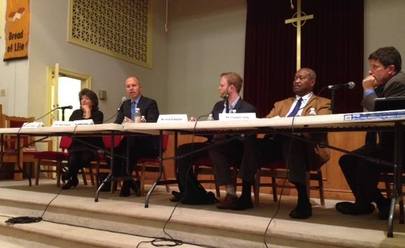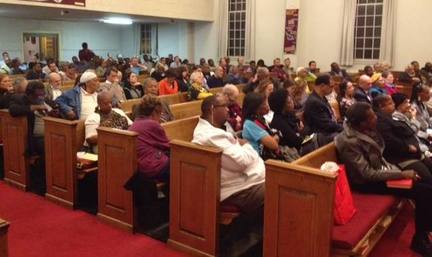 Carol Schwartz, far left, and David Catania, second from left, field questions.
Carol Schwartz, far left, and David Catania, second from left, field questions. Each candidate was asked to state their perceptions on D.C. Mayor Vincent Gray's proposal to redraw school boundaries. The proposed system was drawn with the intent to help underprivileged children attend better schools outside of their neighborhoods and to fix the problem of overcrowded versus underused schools. Though Catania agreed with the proposal on the premise that disadvantaged families should be given school preference, he cited harmful "unintended consequences" that would come about as a result. Johnson Middle School in southeast, for example, would be closed under this plan. Rather than overhauling boundaries and risk closing underused schools, critics say more energy should be spent toward improving existing schools. “What we should talk about is how we need to set up our schools to succeed," said Catania.
Schwartz also disagreed with parts of the school boundaries plan, adding that the proposal should be delayed until the new mayor is chosen. "What I don't want to do," she said, is "go back on Brown v. Board. My children were lucky to go to an integrated school." An unintended ramification of the plan includes the further segregation of racial and socioeconomic classes because of the gentrification of certain areas in D.C., Schwartz reasoned.
 Ward 4 residents and YEP-DC'ers packed the Plymouth Congregational Church.
Ward 4 residents and YEP-DC'ers packed the Plymouth Congregational Church. Both candidates veered a bit from the school safety topic when Catania touched on the lack of stability in the city's schools, stemming from high turnover in school leadership, particularly in the east side of the district. "We're burning them out. Expectations are too high and resources are too scarce," said Catania, back to his point about the need to concentrate on setting up schools to succeed. Schwartz blamed the high principal and teacher turnover, which she cited as approximately 25 percent and 50 percent, respectively, on the over-emphasis and pressure to "teach to the test." "There's no creativity from teachers, and so they are nervous wrecks, and no one wants to do this [teaching] anymore," she said.
Improving Teaching in the District
To attract high-quality teachers to the district, Schwartz recommended giving tax credits to teachers as an incentive to get them to live in the city, and sending more tutors and adult educators (with full background checks) to provide classroom teachers with extra support. Catania spoke about the importance of improving working conditions for teachers, especially in the low-performing schools, as part of his retention plan. "It's not just about the money we pay them," he said.
Schwartz, a former special education teacher, and Catania, who spent last year working with the D.C. Children's Law Center on special education issues, received favorable nods and claps from the crowd on their views on education, before the debate went on to other issues such as affordable housing, transportation, and crime. Most of the tension in the room came not between the two candidates, but from the audience’s frustration that the views of Muriel Bowser, a Democrat who represents Ward 4 as a councilmember, were absent from the debate. She was attending a “meet and greet” in another part of the city, and had also participated in an education forum the night before with the other candidates.
The city will determine the next mayor on Nov. 4. Find your polling place here.
Francesca Duffy is a communications and advocacy specialist at a national association for school superintendents. She can be reached via email or Twitter.

 RSS Feed
RSS Feed